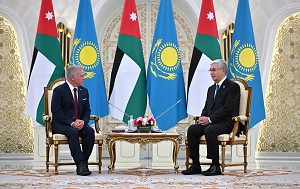NCHR launches 21st annual report on human rights in Jordan
The Jordan Times
AMMAN — The National Centre for Human Rights (NCHR) officially launched its 21st annual report on the state of human rights in Jordan for 2024 on Wednesday. The report is intended to serve as a comprehensive tool for assessing progress in the protection and promotion of rights, identifying shortcomings and providing recommendations for reform.
At the launch ceremony in Amman, which was attended by Minister of Political and Parliamentary Affairs Abdul MunimOudat, Lower House Speaker Ahmad Safadi, and ministers and public figures, NCHR Board of Trustees Chairperson Samar Haj Hasan stressed that the report's release is a legal requirement under Article 12 of the NCHR Law.
“The annual report is not a routine document, but rather the result of a year-long process of monitoring and analysis,” she said, adding that this method guarantees the development of evidence-based policies, as it offers an objective diagnosis that emphasises progress and identifies gaps, deficiencies, or violations.
The political, economic, and social Spheres are the focus of 155 recommendations in this year's edition. They were developed through field verification and data collection, with a particular emphasis on safeguarding the most vulnerable groups, according to Haj Hasan.
She also the centre will collaborate with official institutions, civil society, and partners to develop an action plan for the implementation of the recommendations, which will be guided by clear timeframes and measurable indicators.
“Jordan is dedicated to safeguarding human rights as a fundamental principle of the state, in conjunction with the political will that is driving the modernisation process, creatingan enabling environment for the NCHR to fulfil its mandate. Our responsibility is to guarantee that the constitutional rights of both citizens and residents are upheld in accordance with international standards."
Methodology and Findings
NCHR Commissioner General Jamal Shamayleh characterised the report's release as a significant national milestone. “This is not merely a collection of statistics or indicators; it is a rights-based evaluation that monitors freedoms, measures progress, identifies challenges, and elucidates their causes, all while providing practical, field-based recommendations,” he stated.
He also noted that the report is a reflection of “systematic institutional work”, which is based on continuous monitoring and field visits. He emphasised that political, economic, and administrative modernisation projects are inextricably linked to human rights, and he underscored that the report assesses their influence on the dignity and liberties of individuals.
The centre received 519 complaints in 2024 regarding civil and political rights across nine primary categories, including the rights to vote and run for election, freedom of opinion and expression, freedom of the press and media, access to information, and the right to establish and join political parties, according to Shamayleh.
The centre’s accomplishments in the protection of vulnerable groups, including women, children, and individuals with disabilities, as well as in economic, social, and cultural rights, were also emphasised.
Shamayleh indicated that the report functions as a reference for evaluating the impact of laws and policies on daily life and the extent to which institutions adhere to national and international standards.
A copy of the report was presented to His Majesty King Abdullah at Al Husseiniya Palace by Haj Hasan and Shamaylehone day prior.
Attended by Royal Court Chief Yousef Hassan Issawi and King's Office Director Ala Batayneh, the meeting reviewed the report's findings, discussed human rights developments in the past year, and considered recommendations to further strengthen freedoms and rights in the Kingdom.




